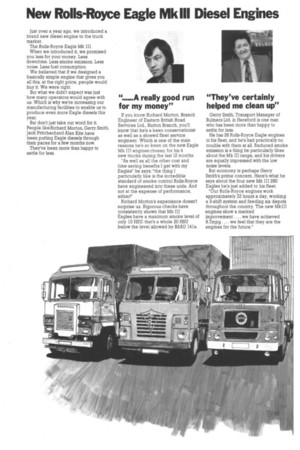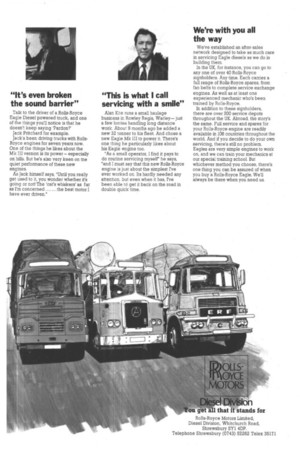New Rolls-Royce Eagle Mk11111 Diesel Engines
Page 196

Page 197

If you've noticed an error in this article please click here to report it so we can fix it.
Just over a year ago, we introduced a brand new diesel engine to the truck market.
The Rolls-Royce Eagle Mk III.
When we introduced it, we promised you less for your money. Less downtime. Less smoke emission. Less noise. Less fuel consumption.
We believed that if we designed a basically simple engine that gives you all this, at the right price, people would buy it. We were right.
But what we didn't expect was just how many operators would agree with us. Which is why we're increasing our manufacturing facilities to enable us to produce even more Eagle diesels this year.
But don't just take our word for it. People like Richard Morton, Gerry Smith, Jack Pritchard and Alan Kite have been putting Eagle diesels through their paces for a few months now. They've been more than happy to settle for less. If you know Richard Morton, Branch Engineer of Eastern British Road Services Ltd., Burton Branch, you'll know that he's a keen conservationist as well as a shrewd fleet service engineer. Which is one of the main reasons he's so keen on the new Eagle Mik III engines chosen for his 4 new trucks during the last 12 months.
"As well as all the other cost and time saving benefits I get with my Eagles" he says; "the thing I particularly like is the incredible standard of smoke control Rolls-Royce have engineered into these units. And not at the expense of performance, either!"
Richard Morton's experience doesn't surprise us. Rigorous checks have consistently shown that Mk III Eagles have a maximum smoke level of only 10 HSU: that's a whole 20 HSU below the level allowed by BSAU 141a Gerry Smith, Transport Manager of Bulmers Ltd. in Hereford is one man who has been more than happy to settle for less.
He has 26 Rolls-Royce Eagle engines in his fleet, and he's had practically no trouble with them at all. Reduced smoke emission is a thing he particularly likes about the Mk III range, and his drivers are equally impressed with the low noise levels.
But economy is perhaps Gerry Smith's prime concern. Here's what he says about the four new Mk III 280 Eagles he's just added to his fleet.
"Our Rolls-Royce engines work approximately 22 hours a day, working a 3-shift system and feeding six depots throughout the country. The new Mk1II engines show a marked improvement we have achieved 8.7mpg .... we feel that they are the engines for the future." Talk to the driver of a Rolls-Royce Eagle Diesel powered truck, and one of the things you'll notice is that he doesn't keep saying Pardon?'
Jack Pritchard for example.
Jack's been driving trucks with RollsRoyce engines for seven years now. One of the things he likes about the Mk III version is its power — especially on hills. But he's also very keen on the quiet performance of these new engines.
As jack himself says, "Until you really get used to it, you wonder whether it's going or not! The 'cat's whiskers' as far as I'm concerned the best motor I have ever driven.' Alan Kite runs a small haulage business in Rowley Regis, Warley— just a few lorries handling long distance work. About 9 months ago he added a new 32 tonner to his fleet. And chose a new Eagle Mk III to power it. There's one thing he particularly likes about his Eagle engine too.
"As a small operator, I find it pays to do routine servicing myself' he says, "and I must say that this new Rolls-Royce engine is just about the simplest I've ever worked on. Its hardly needed any attention, but even when it has, I've been able to get it back on the road in double quick time. We've established an after-sales network designed to take as much care in servicing Eagle diesels as we do in building them.
In the UK, for instance, you can go to any one of over 40 Rolls-Royce signholders. Any time. Each carries a full range of Rolls-Royce spares, from fan belts to complete service exchange engines. As well as at least one experienced mechanic who's been trained by Rolls-Royce.
In addition to these signholders, there are over 200 service depots throughout the UK. Abroad, the story's the same. Full service and spares for your Rolls-Royce engine are readily . available in 108 countries throughout the world. And if you decide to do your own servicing, there's still no problem. Eagles are very simple engines to work on, and we can train your mechanics at our special training school But whichever method you choose, there's one thing you can be assured of when you buy a Rolls-Royce Eagle. We'll always be there when you need us.




































































































































































































































































































































































